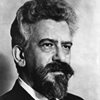Subtotal: $
Checkout
The Evil of Indifference
Some are guilty, but all are responsible.
By Abraham Joshua Heschel
June 4, 2020
The following reading is excerpted from Thunder in the Soul.
There is an evil which most of us condone and are even guilty of: indifference to evil. We remain neutral, impartial, and not easily moved by the wrongs done unto other people. Indifference to evil is more insidious than evil itself; it is more universal, more contagious, more dangerous. A silent justification, it makes possible an evil erupting as an expression becoming the rule and being in turn accepted.
The prophets’ great contribution to humanity was the discovery of the evil of indifference. One may be decent and sinister, pious and sinful.
The prophet is a person who suffers the harm done to others. Wherever a crime is committed, it is as if the prophet were the victim and the prey. The prophet’s angry words cry. The wrath of God is a lamentation. All prophecy is one great exclamation point: God is not indifferent to evil! He is always concerned, He is personally affected by what man does to man. He is a God of pathos.
In condemning the clergymen who joined Dr. Martin Luther King Jr. in protesting against local statutes and practices which denied constitutional liberties to groups of citizens on account of race, a white preacher declared: “The job of the minister is to lead the souls of men to God, not to bring about confusion by getting tangled up in transitory social problems.”
In contrast to this definition, the prophets passionately proclaim that God himself is concerned with the “transitory social problems,” with the blights of society, with the affairs of the marketplace.
What is the essence of being a prophet? A prophet is a person who holds God and men in one thought at one time, at all times. Our tragedy begins with the segregation of God, with the bifurcation of the secular and the sacred. We worry more about the purity of dogma than the integrity of love. We think of God in the past tense and refuse to realize that God is always present and never, never past; that God may be more intimately present in slums than in mansions; with those who are smarting under the abuse of the callous.
There are of course, many among us whose record in dealing with [African Americans] and other minority groups is unspotted. However, an honest estimation of the moral state of our society will disclose: Some are guilty, but all are responsible. If we admit that the individual is in some measure conditioned or affected by the public climate of opinion, an individual’s crime discloses society’s corruption. In a community not indifferent to suffering, uncompromisingly impatient with cruelty and falsehood, racial discrimination would be infrequent rather than common.
That equality is a good thing, a fine goal, may be generally accepted. What is lacking is a sense of the monstrosity of inequality. Seen from the perspective of prophetic faith, the predicament of justice is the predicament of God.
Of course, more and more people are becoming aware of the [problem of racism], but they fail to grasp its being a personal problem. People are increasingly fearful of social tension and disturbance. However, so long as our society is more concerned to prevent racial strife than to prevent humiliation, the cause of strife, its moral status will be depressing, indeed.

Two-minute warning on Bloody Sunday, March 7, 1965. National Archives
Source: The Insecurity of Freedom: Essays on Human Existence (New York: Farrar, Straus and Giroux, 1966), 92–94.
Already a subscriber? Sign in
Try 3 months of unlimited access. Start your FREE TRIAL today. Cancel anytime.







Lawrence
My reading of scripture tells me that "only God is good". So of course we are all responsible. My life today is a personal tussle with my own failings. Jesus wants me to walk that extra mile, of that I am sure. God has made me aware of myself. That is His gift. His "peace that passeth all understanding" has been at times a blessing. To be guided from within (the inner chamber) may mean lesss of me and more of He, and above all obedience to what He has made me aware of. Curiously, though, He seems able to adapt to individual needs, talents - and show how to make the best of them. It means that I am indeed, not a robot